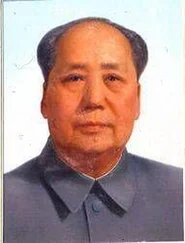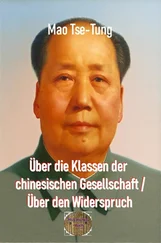Tse-tung Mao - The Little Red Book
Здесь есть возможность читать онлайн «Tse-tung Mao - The Little Red Book» весь текст электронной книги совершенно бесплатно (целиком полную версию без сокращений). В некоторых случаях можно слушать аудио, скачать через торрент в формате fb2 и присутствует краткое содержание. Жанр: Политика, на английском языке. Описание произведения, (предисловие) а так же отзывы посетителей доступны на портале библиотеки ЛибКат.
- Название:The Little Red Book
- Автор:
- Жанр:
- Год:неизвестен
- ISBN:нет данных
- Рейтинг книги:5 / 5. Голосов: 1
-
Избранное:Добавить в избранное
- Отзывы:
-
Ваша оценка:
- 100
- 1
- 2
- 3
- 4
- 5
The Little Red Book: краткое содержание, описание и аннотация
Предлагаем к чтению аннотацию, описание, краткое содержание или предисловие (зависит от того, что написал сам автор книги «The Little Red Book»). Если вы не нашли необходимую информацию о книге — напишите в комментариях, мы постараемся отыскать её.
The Little Red Book — читать онлайн бесплатно полную книгу (весь текст) целиком
Ниже представлен текст книги, разбитый по страницам. Система сохранения места последней прочитанной страницы, позволяет с удобством читать онлайн бесплатно книгу «The Little Red Book», без необходимости каждый раз заново искать на чём Вы остановились. Поставьте закладку, и сможете в любой момент перейти на страницу, на которой закончили чтение.
Интервал:
Закладка:
"The United Front in Cultural Work" (October 30, 1944), Selected Works, Vol. III, pp. 236-37.*
Our congress should call upon the whole Party to be vigilant and to see that no comrade at any post is divorced from the masses. It should teach every comrade to love the people and listen attentively to the voice of the masses; to identify himself with the masses wherever he goes and, instead of standing above them, to immerse himself among them; and, according to their present level, to awaken them or raise their political consciousness and help them gradually to organize themselves voluntarily and to set going all essential struggles permitted by the internal and external circumstances of the given time and place.
"On Coalition Government" (April 24, 1945), Selected Works, Vol. III, pp. 315-I6.
If we tried to go on the offensive when the masses are not yet awakened, that would be adventurism. If we insisted on leading the masses to do anything against their will, we would certainly fail. If we did not advance when the masses demand advance, that would be Right opportunism.
"A Talk to the Editorial Staff of the Shansi-Suiyuan Daily" (April 2, I948), Selected Works, Vol. IV, p. 243.
Commandism is wrong in any type of work, because in overstepping the level of political consciousness of the masses and violating the principle of voluntary mass action it reflects the disease of impetuosity. Our comrades must not assume that everything they themselves understand is understood by the masses. Whether the masses understand it and are ready to take action can be discovered only by going into their midst and making investigations. If we do so, we can avoid commandism. Tailism in any type of work is also wrong, because in falling below the level of political consciousness of the masses and violating the principle of leading the masses forward it reflects the disease of dilatoriness. Our comrades must not assume that the masses have no understanding of what they themselves do not yet understand. It often happens that the masses outstrip us and are eager to advance a step and that nevertheless our comrades fail to act as leaders of the masses and tail behind certain backward elements, reflecting their views and, moreover, mistaking them for those of the broad masses.
"On Coalition Government" (April 24, 1945), Selected Works, Vol. III, p. 316.*
Take the ideas of the masses and concentrate them, then go to the masses, persevere in the ideas and carry them through, so as to form correct ideas of leadership - such is the basic method of leadership.
"Some Questions Concerning Methods of Leadership" (June 1, 1943), Selected Works, Vol. III, p. 120.
In all the practical work of our Party, all correct leadership is necessarily "from the masses, to the masses". This means: take the ideas of the masses (scattered and unsystematic ideas) and concentrate them (through study turn them into concentrated and systematic ideas), then go to the masses and propagate and explain these ideas until the masses embrace them as their own, hold fast to them and translate them into action, and test the correctness of these ideas in such action. Then once again concentrate ideas from the masses and oDce again go to the masses so that the deas are persevered in and carried through. And so on, over and over again in an endless spiral, with the ideas becoming more correct, more vital and richer each time. Such is the Marxist theory of knowledge.
Ibid ., p. 119.
We should go to the masses and learn from them, synthesize their experience into better, articulated principles and methods, then do propaganda among the masses, and call upon them to put these principles and methods into practice so as to solve their problems and help them achieve liberation and happines.
"Get Organized!" (November 29, 1943), Selected Works, Vol. III, p. 158.
There are people in our leading organs in some places who think that it is enough for the leaders alone to know the Party's policies and that there is no need to let the masses know them. This is one of the basic reasons why some of our work cannot be done well.
"A Talk to the Editorial Staff of the Shansi-Suiyuan Daily" (April 2, 1948), Selected Works, Vol. IV, p. 241.
In all mass movements we must make a basic investigation and analysis of the number of active supporters, opponents and neutrals and must not decide problems subjectively and without basis.
"Methods of Work of Party Committees" (March 13, 1949), Selected Works, Vol. IV, p. 380.
The masses in any given place are generally composed of three parts, the relatively active, the intermediate and the relatively backward. The leaders must therefore be skilled in uniting the small number of active elements around the leadership and must rely on them to raise the level of the intermediate elements and to win over the backward elements.
"Some Questions Concerning Methods of Leadership" (June 1, 1943), Selected Works, Vol. III, p. 118.
To be good at translating the Party's policy into action of the masses, to be good at getting not only the leading cadres but also the broad masses to understand and master every movement and every struggle we launch - this is an art of MarxistLeninist leadership. It is also the dividing line that determines whether or not we make mistakes in our work.
"A Talk to the Editorial Staff of the Shansi-Suiyuan Daily" (April 2, 1948), Selected Works, Vol. IV, pp 242-43.
However active the leading group may be, its activity will amount to fruitless effort by a handful of people unless combined with the activity of the masses. On the other hand, if the masses alone are active without a strong leading group to organize their activity properly, such activity cannot be sustained for long, or carried forward in the right direction, or raised to a high level.
"Some Questions Concerning Methods of Leadership" (June 1, 1943), Selected Works, Vol. III, p. 118.
Production by the masses, the interests of the masses, the experiences and feelings of the masses - to these the leading cadres should pay constant attention.
Inscription for a production exhibition sponsored by organizations directly under the Central Committee of the Party and the General Headquarters of the Eighth Route Army, Liberation Daily of Yenan, November 24, 1943.
We should pay close attention to the well-being of the masses, from the problems of land and labour to those of fuel, rice, cooking oil and salt… All such problems concerning the well-being of the masses should be placed on our agenda. We should discuss them, adopt and carry out decisions and check up on the results. We should help the masses to realize that we represent their interests, that our lives are intimately bound up with theirs. We should help them to proceed from these things to an understanding of the higher tasks which we have put forward, the tasks of the revolutionary war, so that they will support the revolution and spread it throughout the country, respond to our political appeals and fight to the end for victory in the revolution.
"Be Concerned with the Well-Being of the Masses, Pay Attention to Methods of Work" (January 27, 1934), Selected Works, Vol. I, p. 149.*
12. POLITICAL WORK
The system of Party representatives and of political departments, adopted for the first time in China, entirely changed the complexion of these armed forces. [1] The Red Army, which was founded in 1927, and the Eighth Route Army of today have inherited this system and developed it.
"Interview with the British Journalist James Bertram" (October 25, 1937), Selected Works, Vol. II, p. 54.
The People's Liberation Army has developed its vigorous revolutionary political work, which is an important factor in winning victory over the enemy, on the basis of a people's war and of the principles of unity between army and people, of unity between commanders and fighters and of disintegrating the enemy troops.
Читать дальшеИнтервал:
Закладка:
Похожие книги на «The Little Red Book»
Представляем Вашему вниманию похожие книги на «The Little Red Book» списком для выбора. Мы отобрали схожую по названию и смыслу литературу в надежде предоставить читателям больше вариантов отыскать новые, интересные, ещё непрочитанные произведения.
Обсуждение, отзывы о книге «The Little Red Book» и просто собственные мнения читателей. Оставьте ваши комментарии, напишите, что Вы думаете о произведении, его смысле или главных героях. Укажите что конкретно понравилось, а что нет, и почему Вы так считаете.











